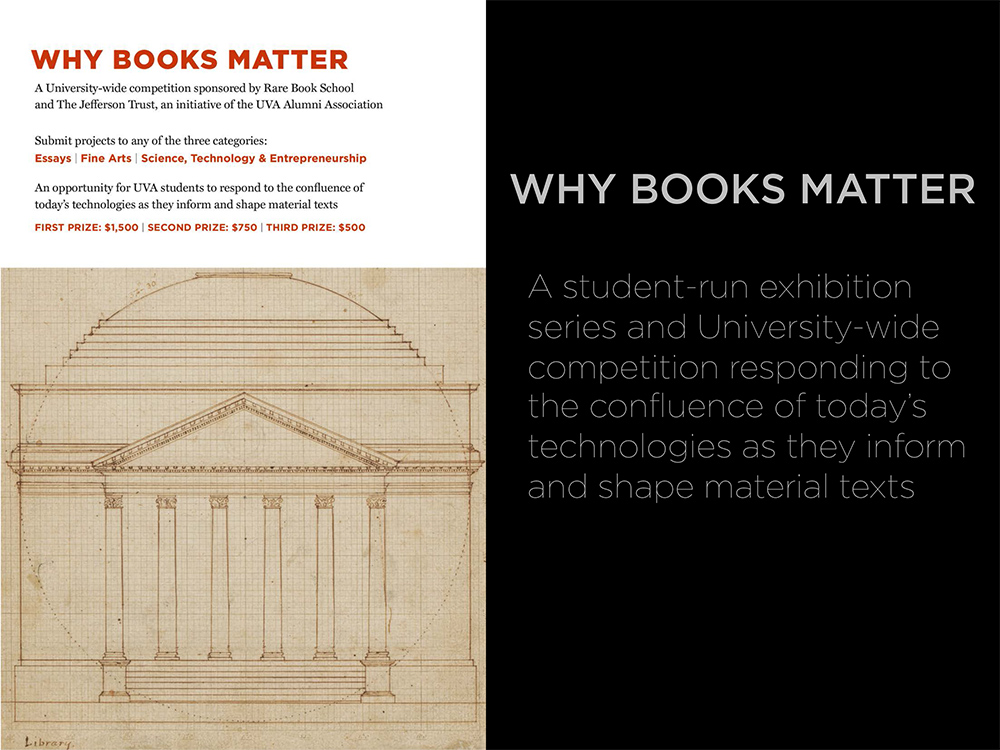A book “opens itself to a reader in any future, a small but beautiful gesture of faith in human connection,” wrote one of the winners of the Rare Book School’s “Why Books Matter” contest for University of Virginia students.
Graduating student Victoria Kornick, who majored in poetry writing, made an artistic book, “Form Noir,” with drawings, poems and prose. She was one of nine individuals or groups who won a prize for her project.
The annual University-wide competition asked U.Va. students to explore the changing nature of textual media and to envision new approaches to engaging with books as physical objects.
The competition was part of a celebration of Rare Book School’s 20th anniversary on Grounds, held late last month in Alderman Library, during which the students were honored and some of their work was displayed.
The program demonstrates part of the Rare Book School’s mission: to promote research and design related to the book, broadly conceived as written, printed and born-digital materials. A submission could focus on a topic from a wide range of possibilities.
Students submitted a range of projects, including straightforward essays, artist books with textual elements, and concepts, such as one for a new digital reader and another for an online program to find available study spaces at U.Va.’s libraries.
Madeleine Ward took a 1942 book, “A Short History of the United States,” and reinterpreted it by adding drawings, censoring passages, highlighting words and phrases and blocking out parts of maps.
Scott Elwood’s project proposed an outdoor public library without any physical books. “I imagine a design with emergent properties that help increase reading, bringing people out of doors,” Elwood wrote.
The competition, sponsored by the Jefferson Trust, offered prizes ranging from $500 to $1,500 in three divisions. The following students received awards, and the Rare Book School will publish all of the winning projects on its website by June 1.
Essay
• First prize: Anne Rowlenson, third-year double-major in English and music, “Emily Brontë’s Unquiet Graves and the Physicality of Books”
• Second prize: Abigail Sindzinski, graduate student in English, “What Is the Future of the Book?”
• Third prize: Elisabeth Schettle, graduate student in Spanish, “A Brief History of a Midwesterner’s Reading Habits”
Fine Arts
• First prize: Victoria Kornick, fourth-year major in Area Program in Poetry Writing, “Form Noir”
• Second prize: Michelle Ross, fourth-year major in studio art, “How to Build a House”
• Third prize: Madeleine Ward, fourth-year major in comparative literature, “A Short History of the United States”
Science, Technology & Entrepreneurship
• First prize: Team 31, a secret society of undergraduates in architecture, “The Social Reader”
• Second prize: Camrynn Genda, fourth-year major in systems engineering, “bookSpace,” with contributions from fellow students Andrew Han, Luke Lu, Alex Rever and Anne Compton Rodrigue
• Third prize: Scott Ellwood, second-year major in English and studio art, “A 21st-Century Library Designed for a Digital Book Catalogue”
Media Contact
Article Information
May 3, 2013
/content/rare-book-school-awards-uva-students-projects-why-books-matter

